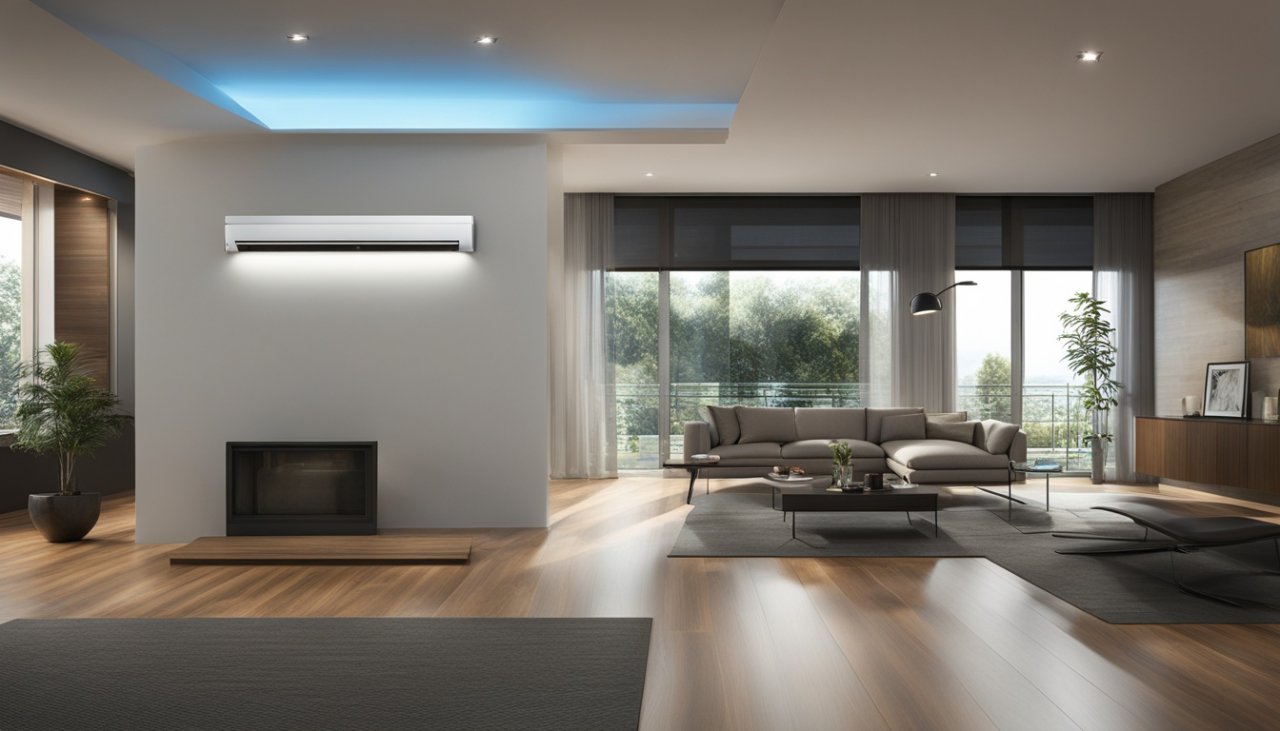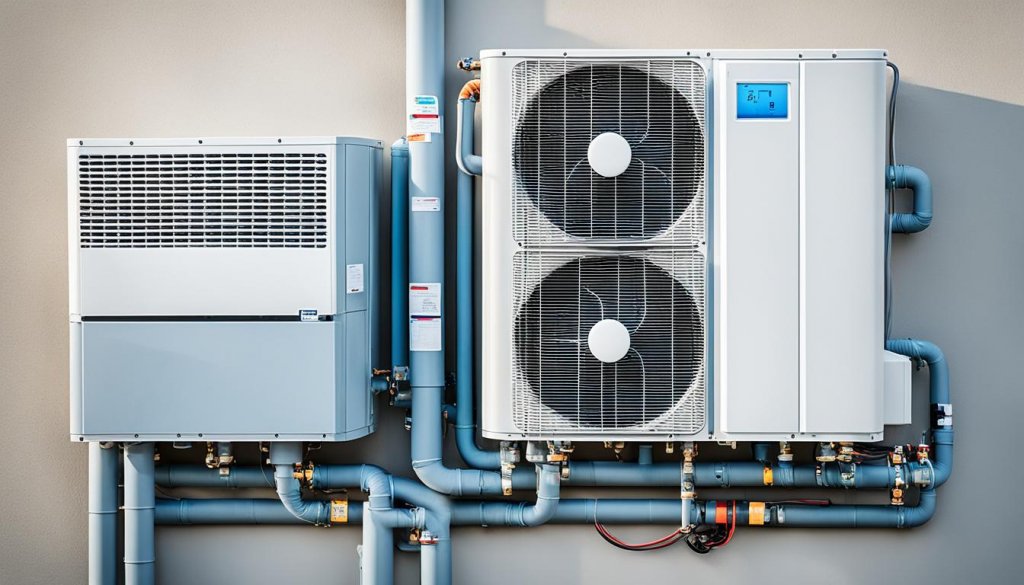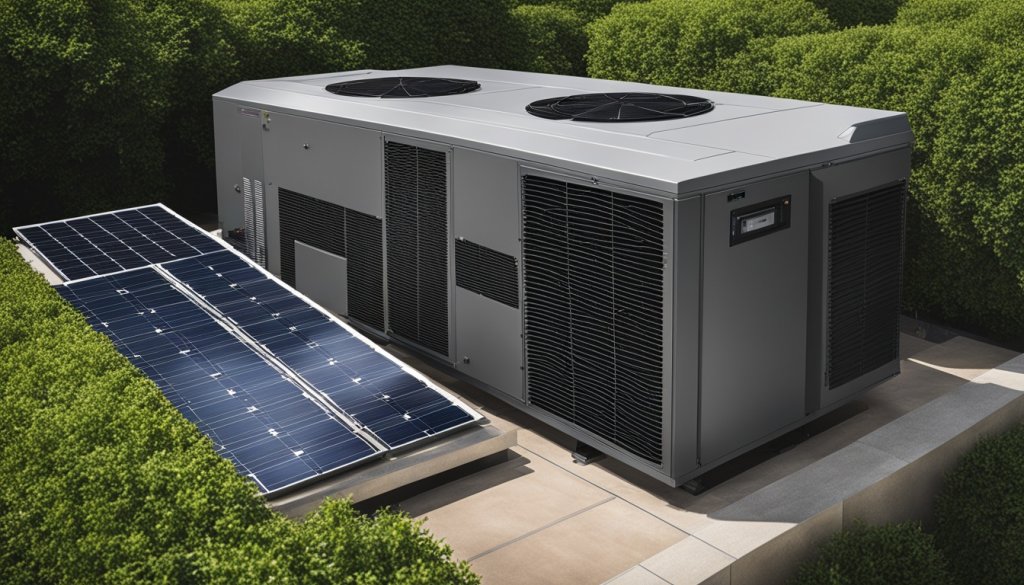Have you ever thought about how much energy and money you could save with new HVAC systems? A lot of energy in our homes goes to heating and cooling. By using more efficient systems, we can cut our bills and help the planet. Let’s look at how modern HVAC technology can make a big difference.

Key Takeaways
- Energy efficient HVAC systems can significantly lower energy bills.
- High efficiency heating and cooling systems are essential for reducing overall energy consumption.
- Investing in sustainable HVAC technology improves indoor air quality and extends equipment lifespan.
- Implementing proper maintenance practices can optimize HVAC performance and efficiency.
- Renewable energy sources can be integrated into HVAC systems to further enhance efficiency.
Understanding HVAC Energy Efficiency
It’s crucial to understand what makes HVAC systems energy efficient. These systems work better with proper installation, high-efficiency units, and regular maintenance. Energy-saving HVAC units use technology to use less energy and work better. Knowing these factors helps in choosing the right systems for your home.
What Makes HVAC Systems Energy Efficient?
Several metrics show how efficient HVAC systems are. The Seasonal Energy Efficiency Ratio (SEER) compares cooling output to energy used. A higher SEER means the system uses less energy for cooling. The Energy Efficiency Ratio (EER) looks at energy use in a controlled setting. The Heating Season Performance Factor (HSPF) checks how well heat pumps work, with a higher score meaning better efficiency.
Understanding these metrics helps people pick energy-efficient HVAC technologies that work well.
The Role of Heating, Ventilation, and Air Conditioning in Energy Consumption
Heating, ventilation, and air conditioning use a lot of energy in buildings. Over 65% of home energy use is for heating and cooling, says the Environmental Protection Agency. Using energy-saving air conditioning, like programmable thermostats and proper insulation, can cut energy use. Simple actions, like changing air filters or sealing leaks, also boost HVAC efficiency.
My own experience shows that small changes, like using fans or placing the HVAC unit right, can lower energy use.
Why Prioritize Energy Efficiency in HVAC Systems?
Improving energy efficiency in HVAC systems helps me save money and protect the planet. By choosing energy-efficient upgrades, I can cut down on energy costs and help the environment. These upgrades lead to big savings over time.
Impact on Energy Costs
Energy-efficient HVAC upgrades use less energy for heating or cooling. They have better SEER and HSPF ratings, which means they work more efficiently. This can save me 10-30% on my monthly bills.
The cost of these upgrades is worth it because they use less energy. This means I pay less for utilities over time.
Benefits to Sustainability and the Environment
Choosing green HVAC solutions helps reduce harmful emissions. Systems like geothermal and air-source heat pumps use less fossil fuel. This is good for the planet’s future.
These systems make my home more comfortable and keep the air clean. They reduce air leaks and keep airflow steady. This is great for people with breathing problems.
Adding insulation and programmable thermostats can make these systems even better. This helps me enjoy the full benefits of energy-efficient HVAC.
The Benefits of an Efficient HVAC System
Getting an efficient HVAC system brings many benefits that make daily life better and cut costs. These systems use less energy, which means lower bills for me. They also make my equipment last longer and improve the air I breathe indoors.
Cost Savings on Utility Bills
High-efficiency heating and cooling systems can save a lot on utility bills. They use less energy than old systems, which lowers my monthly costs by 10% to 30%. Choosing a system with a high SEER rating means even more savings, which is good for my wallet.
Extended Equipment Lifespan and Reliability
Efficient models often last longer than old ones, which means fewer repairs and replacements. With regular upkeep, these systems stay reliable and don’t break down often. This means I get steady comfort at home without the hassle of frequent fixes.
Improvement in Indoor Air Quality
A good, efficient HVAC system makes the air inside my home cleaner. Units with HEPA filters catch almost all dust, pollen, and allergens. This cleaner air makes me and my family healthier and more comfortable, making the cost of these systems a smart choice.

Top Strategies for Enhancing HVAC Energy Efficiency
Making HVAC systems more energy efficient is key to better performance and lower energy bills. By using a few smart strategies, I can boost my system’s efficiency and help the planet. Here are some easy ways to make your HVAC system more energy efficient.
Regular Maintenance Practices
Regular maintenance is a must for HVAC systems. Changing air filters every three months stops the system from working too hard and wasting energy. Annual inspections help spot problems early, ensuring my heating and cooling systems work well. If I ignore these steps, my system might not work right, wasting energy and causing damage.
Optimizing Operation Hours
Adjusting when I use my HVAC can save a lot of energy. Lowering the thermostat by 10 degrees for 8 hours a day can cut energy costs by 15% a year. Using smart thermostats that meet ENERGY STAR standards helps me control my system better, saving about $100 a year. Closing blinds during the day keeps my home at a good temperature, using less energy for heating or cooling.
Sealing and Insulating Ductwork
Sealing and insulating ducts can really improve energy efficiency. This can make my HVAC system up to 20% more efficient. By sealing ducts, I stop air leaks, which means using less energy. This goes well with sustainable HVAC technology, making my home more efficient.
Energy Efficient HVAC Systems: Choosing the Right Equipment
Choosing the right HVAC system can save a lot of energy and help the environment. It’s important to know about SEER ratings to make smart choices. A higher SEER means the system uses less energy, which lowers your bills and keeps you comfortable.
Understanding Efficiency Ratings Like SEER
Units with a SEER of 14.5 or higher are good for saving energy. For even better efficiency, look at the HSPF rating, especially for heat pumps. Knowing these ratings helps me pick the best equipment for saving energy and being eco-friendly.
Benefits of ENERGY STAR Certified Equipment
ENERGY STAR certified HVAC systems meet strict energy-saving standards. They can save you 10-30% a year. This certification helps me use less energy and might even get me tax breaks. These savings make the cost of the system worth it over time.
Advanced HVAC Technology and Innovations
The evolution of HVAC technology brings new ways to save energy and be kind to the planet. It’s thrilling to see how new tech makes HVAC systems better for the environment and our wallets. These changes make our homes more comfortable and use less energy.
Emerging Trends in Sustainable HVAC Technology
Smart thermostats are a big deal in the world of sustainable HVAC. They use sensors and algorithms to learn what you like, adjusting the temperature for you. This means you use less energy. Zoning systems also let you control the temperature in different parts of your home, saving even more energy.
Today’s HVAC systems have cool features like variable-speed compressors and predictive maintenance. These help spot problems early, cutting down on repair costs and downtime. By using IoT tech, HVAC systems can work smarter, using data from weather forecasts and how many people are home.
Smart Thermostats and Control Systems
Smart thermostats are key to using less energy with your HVAC. They learn your habits to keep you comfy while saving energy. Plus, modern HVAC systems have filters that clean the air, making it healthier to breathe and eco-friendly.
Technologies like thermally driven air conditioning and dual fuel heat pumps are super efficient. They can work up to four times better than old systems. Looking ahead, each new HVAC innovation brings us closer to a greener future.

Utilizing Renewable Energy Sources with HVAC
Looking into renewable energy for HVAC brings new chances for saving energy and being green. Using solar panels and geothermal heating can cut down on energy use a lot. These technologies let me keep my home comfy and help the planet at the same time.
Integrating Solar Panels with HVAC Systems
Solar-powered HVAC systems are a big step forward in saving energy. They use the sun’s power to lessen our need for traditional energy. This means lower bills every month. Plus, the federal solar Investment Tax Credit (ITC) gives homeowners a 30% credit for solar and HVAC setups together.
There are also easy financing options for these upgrades. This lets me improve my home’s value with energy-saving features without spending a lot.
Benefits of Geothermal Heating and Cooling
Geothermal HVAC systems are another green choice. They use the earth’s steady temperature to heat and cool homes better than usual methods. This can save a lot of energy over time, leading to lower bills and less pollution.
These systems also last longer and need less upkeep, making them a smart choice for the future.
The Role of HVAC Analytics for Energy Efficiency
In today’s world, knowing how to make HVAC systems work better is key for homeowners and facility managers. HVAC analytics give me insights into how well my systems are doing. This helps me find ways to save energy and make my systems more efficient and green.
Monitoring Systems: Keeping Track of Performance
Using a monitoring system is vital for keeping HVAC systems efficient. These systems give me real-time data on things like energy use and how well equipment is working. I can spot problems like leaks or bad insulation that I might not have noticed before.
This tech lets me make smart choices for repairs and keep my indoor spaces comfortable.
Identifying Inefficiencies and Potential Improvements
By analyzing data, I can find ways to cut down on energy use. Problems like old equipment or units that are the wrong size waste a lot of energy. Fixing these issues can lead to big savings on my energy bills.
Upgrading and using sustainable HVAC tech also lowers my carbon footprint and makes the air inside healthier. For more info, I can call 770-694-6232 to talk about HVAC system analysis.
Understanding Common HVAC Issues and Solutions
Knowing about common HVAC problems can make my home more energy efficient. Issues can come from many places, affecting how well energy saving HVAC units work. For example, dirty filters often cause systems to work less efficiently. Cleaning and maintaining them can quickly fix these problems.
Common HVAC Problems Affecting Energy Efficiency
Many homeowners struggle with clogged ductwork, which harms indoor air quality. It’s important to clean ducts regularly for good airflow. Also, thermostats that don’t work right can lead to heating or cooling problems. These might need a professional to fix them quickly.
Other common issues include tripped breakers and blown fuses, often from furnaces working too hard because of dirty filters.
How to Diagnose and Fix HVAC Issues
It’s key to figure out HVAC problems to solve them right. I can start by checking the filters and making sure they’re clean. Water leaks from the unit, usually from clogged drainage lines, need quick action to prevent damage.
Uneven room temperatures might mean the ductwork needs to be changed. Keeping up with energy efficient HVAC upgrades is important for the system to work well over time. Getting help from experts for electrical or pilot light issues can keep my home safe and comfortable.
Conclusion
Thinking about energy efficient HVAC systems shows they offer big cost savings and better comfort at home. By choosing modern systems, I can cut my energy bills and help the planet. These systems are designed to use less energy while keeping my home comfortable.
There are many incentives and rebates from energy companies and government programs to help us switch to more efficient systems. This makes it easier for homeowners to get systems with higher SEER ratings. These systems use less energy and work better.
In conclusion, making smart HVAC choices helps us all. By picking energy efficient systems, we save money and help the environment. Let’s work together towards a greener future with energy-saving HVAC systems.
See how FieldAx can transform your Field Operations.
Try it today! Book Demo
You are one click away from your customized FieldAx Demo!
FAQ
What makes HVAC systems energy efficient?
Energy efficient HVAC systems aim to work better while using less energy. They need proper installation, high-efficiency units, and regular upkeep. This helps cut down on energy use.
How do heating and cooling systems impact energy consumption?
Heating, ventilation, and air conditioning use about half of a home’s energy. Making them more efficient can lower energy bills and cut down on carbon emissions.
What are the cost impacts of prioritizing energy efficiency in HVAC systems?
Focusing on energy efficiency can save homeowners 10-30% on their bills each year. This is mainly through using efficient HVAC upgrades or high-efficiency systems.
What benefits do energy efficient HVAC systems provide for sustainability?
These systems help the environment by using less energy. This means fewer carbon emissions and supports eco-friendly HVAC solutions.
How can I save on utility bills with an efficient HVAC system?
Using energy-saving HVAC options and keeping up with maintenance helps. This includes changing filters and checking ducts. It cuts down on energy costs for heating and cooling.
What kind of maintenance practices help enhance HVAC energy efficiency?
Regular upkeep like changing filters, setting the right operating hours, and sealing ducts boosts efficiency. This can save up to 20% on energy.
How do I choose the right HVAC equipment for energy efficiency?
Look for efficiency ratings like SEER and choose ENERGY STAR certified units. This ensures I get efficient HVAC systems that save money without losing performance.
What are some emerging trends in HVAC technology?
New HVAC tech includes smart thermostats and control systems. These adjust performance based on what users prefer, cutting energy use.
How can renewable energy sources be integrated with HVAC systems?
Using solar panels or geothermal systems can boost HVAC efficiency. It also reduces the need for traditional energy sources.
What role do HVAC analytics play in improving energy efficiency?
HVAC analytics software helps track system performance and spot inefficiencies. It lets me make data-driven changes to improve efficiency and lower costs.
What are some common HVAC issues that affect energy efficiency?
Issues like poor airflow, worn parts, and wrong thermostat settings can hurt efficiency. Regular checks can find these problems early and fix them.
Author Bio
Co-Founder & CMO at Merfantz Technologies Pvt Ltd | Marketing Manager for FieldAx Field Service Software | Salesforce All-Star Ranger and Community Contributor | Salesforce Content Creation for Knowledge Sharing






